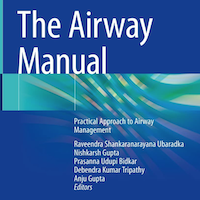Stories Category: Intensive Care

Intra-Abdominal Hypertension – Core Critical Care
The most popular book at ISICEM meeting. Despite increasing interest in intra-abdominal hypertension (IAH) and abdominal compartment syndrome (ACS) as causes of significant morbidity and mortality among the critically ill,... read more

Is Continuous Intra-abdominal Pressure Ready For Prime Time?
Abdominal contents are primarily fluid in character so that pressure within this compartment follows Pascal's hydrostatic law. Intra-abdominal pressure (IAP) is the steady state pressure within the abdominal cavity and changes... read more

Improving Outcomes in Patients with Difficult Airways
Evidence indicates that the airway community has successfully conquered the anatomically difficult airway, as these patients are managed safely with a low incidence of morbidity and mortality. In contrast, the literature... read more

Protective Ventilation
As ventilator induced lung injury (VILI) importantly impacts outcome of mechanically ventilated patients, even in those without lung injury, it follows that those caring for the critically ill should apply protective ventilatory... read more

The Effect of ICU Diaries on PTSD, Anxiety, and Depression
Providing an ICU diary to patients admitted to the ICU reduced the rate of posttraumatic stress disorder (PTSD) symptoms compared with usual care. We included 7 RCTs. Patients who received a diary during the ICU admission... read more

Advanced Bleeding Control in Combat Casualty Care
Consensus was reached on the contents of a standard bleeding control toolbox, where it should be available, providers and training requirements, international registries and guidelines, and potential indications for REBOA... read more

Prone Position in Mechanically Ventilated Patients
The use of prone position (PP) during invasive mechanical ventilation was first reported more than 45 years ago as a mean to improve oxygenation in patients with acute hypoxemic respiratory failure. Improved oxygenation... read more

Etomidate, Adrenal Insufficiency and Mortality Associated with Severity of Illness
Whereas etomidate causes adrenal insufficiency, it was not shown to increase mortality in many analyzed here in ICU settings. However, etomidate associated relative mortality rates increased progressively and correlated with... read more

Co-infection and ICU-acquired Infection in COVID-19 ICU Patients
In patients with severe COVID-19 in the first wave, co-infection at admission to ICU was relatively rare but antibiotic use was in substantial excess to that indication. ICU-AI were common and were significantly associated... read more

Bedside PUG Positively Impact Efficiency and Cost Outcomes in the ICU
This study demonstrates bedside percutaneous ultrasound gastrostomy (PUG) leads to decreased Length of Stay (LOS) and total hospital costs in patients with ventilator-dependent respiratory failure. Hospital costs were significantly... read more

Pulmonary Aeration and Posterior Collapse Assessed by Electrical Impedance Tomography in Healthy Children
The aim of this study was to evaluate the changes in the lung aeration estimated by electrical impedance tomography as the end-expiratory lung impedance after anesthesia induction in pediatric patients. This was a prospective,... read more

The Very Old Critically Ill Patients (Lessons from the ICU)
This book, part of the European Society of Intensive Care Medicine (ESICM) textbook series, provides detailed up-to-date information on the care of the critical ill very old (≥80 years) patients in the ICU. The very... read more

Endoscopic Sleeve Gastroplasty for Treatment of Obesity
Endoscopic sleeve gastroplasty (ESG) is a safe intervention that resulted in significant weight loss, maintained at 104 weeks, with important improvements in metabolic comorbidities. ESG should be considered as a synergistic... read more

Best Critical Care Related Books
As with anything in medical field, there are so many resources that it is difficult and time consuming to determine which ones are the most valuable and worth reading. Therefore, we decided to compile a list of the Best... read more

High Rate of PICS Among SICU Survivors
Through the successful implementation of a multidisciplinary critical care outpatient clinic (CCOC), this study identifies an exorbitant rate of postintensive care syndrome (PICS) among surgical intensive care unit (SICU)... read more

Sepsis-Associated AKI Risks in the PICU
In children with severe sepsis, the degree of hemodynamic support as measured by the VIS and the presence of fluid overload may identify patients at increased risk of developing severe acute kidney injury (AKI). Children... read more

Sedation Management Evolution in the ICU
This paper provided an overview of how ICU sedation practices have evolved over the last 20 years. Contemporary ICU sedation practices include light levels of sedation, SAT, and use of non-benzodiazepines. The current... read more








